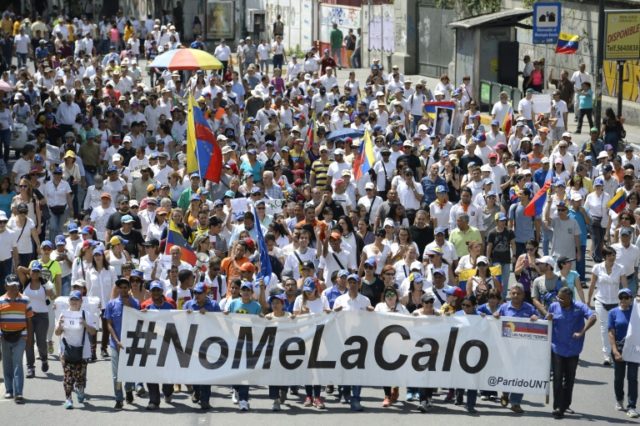Caracas (AFP) – Venezuela’s opposition vowed Thursday to stage “overwhelming, forceful” protests after authorities quashed its hopes of ousting President Nicolas Maduro’s government in a recall referendum.
The Democratic Unity Roundtable (MUD), the center-right opposition coalition, said Venezuelans fed up with a disastrous economic crisis would not accept the authorities’ ruling that a recall can only be held next year — too late to trigger new elections.
“They are violating Venezuelans’ right to remove the president via the constitutional path of a referendum. What is coming now is a massive, peaceful, overwhelming, forceful protest,” said MUD spokesman Jesus Torrealba.
The warning came a day after the National Electoral Council (CNE) said that the referendum the opposition has spent months working for could only be held “in the middle of the first quarter of 2017.”
The timing is the catch.
Polls indicate eight in 10 Venezuelans want a change in government. But if Maduro loses a recall vote after January 10 — four years into his six-year term — he will simply be replaced by his hand-picked vice president.
And the leftist “revolution” launched in 1999 by late president Hugo Chavez will in that case continue until at least 2019.
Torrealba said the opposition would soon announce an updated strategy for a “legal path” to oust Maduro’s government, which it blames for severe shortages of food, medicine and basic goods.
But there are no easy strategy options for MUD.
A fractious coalition that spans the political spectrum, it has often struggled to mobilize large-scale protests despite Maduro’s deep unpopularity.
It meanwhile faces in Maduro a determined adversary with an iron grip on the levers of power.
Even the opposition’s landslide victory in legislative elections last year has done little to chip away at his hold, with the Supreme Court and National Electoral Council (CNE) blocking every move against him.
“The government is trying to divide MUD. It figures internal disagreements will escalate,” said Francine Jacome, head of the Venezuelan Institute for Social and Political Studies.
“Its other plan is to generate hotspots of violence, in which case we would see more repression (by police and the army) and the authorities would halt the recall referendum process,” she told AFP.
– Risky business –
The opposition has warned that Venezuela risks exploding into unrest if a recall vote is not held this year.
The country is still haunted by violence that erupted in 2014 at rival pro- and anti-government demonstrations, leaving 43 people dead.
Maduro stayed home Thursday from the United Nations General Assembly, where he dispatched his foreign minister to give Venezuela’s annual address in his place.
The opposition has indicated it will move ahead with its referendum push despite losing the battle over the date.
Maduro can still be voted out of office after January 10. It would be a humiliating defeat, even though he would be replaced by the vice president of his choice.
In the next stage of the process, MUD must collect four million signatures — 20 percent of the electorate — from October 26 to 28.
But the details for that are also in dispute.
The opposition says the 20-percent threshold should be nationwide, but the CNE ruled it must be reached in every single state.
And the CNE said it will only set up 5,392 of the machines used in the process — less than one-third the number MUD was asking for.
The opposition is hoping to get more than 7.5 million signatures — the number needed to oust Maduro in an ultimate recall vote — in a symbolic show of his government’s unpopularity.
Mobilizing support may be difficult for both the signature drive and an eventual referendum.
“It’s very difficult to get people to vote if they know the same government will stay in power. It will all depend on how bad the situation gets,” said electoral analyst Eugenio Martinez.
On the other hand, however, the government’s strategy could backfire.
“The government is trying to demotivate people, but it could have the opposite effect and stoke indignation,” said Jacome.

COMMENTS
Please let us know if you're having issues with commenting.